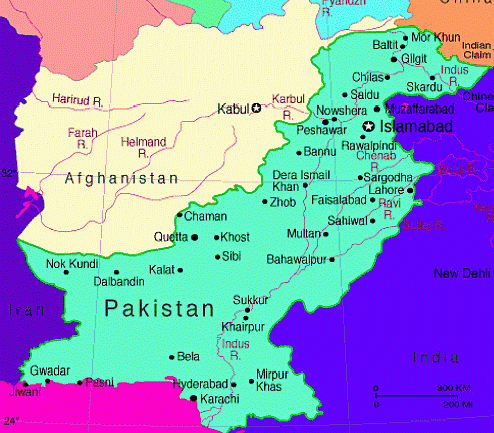Introduction
Karachi is the largest city and former capital of Pakistan on the Arabian Sea near the Indus River delta. The capital of Sindh province, it is Pakistan's chief seaport and industrial center. Karachi is not just a city. It is a unique city in many ways.
Area and Population
From a medium-size city of less than 500,000 population in 1947 it grew to well over five million in 1981 and, according to most conservative estimates, has now exceeded 10 million mark. The area of Karcahi divison is about 3,366 sq. km with more than 18 towns and 6 cantonment boards.
Brief History
This metropolitan city of Karachi was until 1725 A.D. just a barren piece of land , washed on three sides by the blue waters of the Arabian Sea. A few fishermen lived in a small huts on the sunny creek.
There was a pool of water on this barren piece of land which was known as Kalachi-jo-Kun. Kalachi was the name of fisherman whereas kun meant a deep kitch. Therefore, "Kalachi-jo-Kun" meant the deep ditch of Kalacahi, the fisherman.
A few mud huts sprang around this point and their numbers increased. Gradually a village came into being . This village was called as Kalachi-jo-Ghote, which as time passed grew into prominence. Climate
Karachi is located on semi-arid zone but due to marine affects, it enjoys a moderate climate. May and June are hottest months of the year with temperature as high as 43.3 degree centigrade while January is the coldest month with temperature as low as 5 degree centigrade. The mean annual rainfall is about 7 inches. Attractions
Karachi is a city that has a large variety of places to go and things to do. In every part of the city there is some club or organization. No matter where you are, you can be guaranteed a good time.Some of the attractions you will enjoy are handicrafts, particularly rugs and carpets of rare design and beauty, produced by talented artisans. You will find extensive range of restaurants feature cuisine from world over, clean and golden beaches, Theme parks, Zoo, Country & Water parks, Ship breaking tours and many more.
Karachi is a shoppers paradise. If you have the power to purchase you can get finest products at the most reasonable prices in Karachi. Crockery, furniture, paintings, crystal works, marble products, steel goods, classical stitched clothing, glassware, automobile, watches, best textile products and much more.
Historical Architectures
Like Lahore, you also found many historical buildings in Karachi. To name few, some are like Tomb of Quaid-e-Azam, City Courts, The Empress Market, Liaquat National Library, Karachi Port Trust, Sindh assembly buildings, Sindh Madressah-ul-Islam and Wazir Mansion (Home of Quaid-e-Azam).
Other renowned places are like Habib Bank Plaza, MCB Tower, PSO building, Avari Towers. Habib Bank Plaza is the tallest building of the city and the country.
Habib Bank Tower
| |||
Financial Center Karachi Stock Exchange Port of Pakistan Biggest City in Population Industrial Stronghold Tallest Building of Pakistan Habib Bank Tower |
However, many new building construction poses threat to 50 year dominance of Habib Bank tower and in near future MCB tower will replace this title from Habib Bank.
Education
Karachi is also famous for its educational network. There are a number of schools, colleges and institutes imparting education in the fields of science, arts, engineering and information technology. Many universities main campuses resides in Karachi. It also host number of international university campuses and attracts many overseas students.
Some of the well-known universities and institutes include Karachi University, Agha Khan University, NED University, Baqai Medical University, National University, Hamdard University, IBA, Sir Syed University and many more.
Industry
The most of the major banks, financial institutions, insurance companies, corporate houses are based in Karachi. The Industrial areas of the city are SITE, Landhi, Korangi and New Karachi where enormous small, medium and large industrial units are located. Their entire managerial and financial activities are routed through this city. The presence of central bank's head offices is the manifestation of it.Karachi Stock Exchange is the biggest trading center of equity and debt securities. The major money market and currency dealer operates from here. The local and shipping companies are also stationed here owing to its status of being a port city. The people from every nook and corner of the country have settled here due to their economic dependence on the city.
Communication
The Karachi-Peshawar highway links the city with the interior of Pakistan, while the Karachi-O'Mara highway extends along the coast. The Karachi to Zahedan highway connects it with Iran and other Middle Eastern countries. Express roads radiate from the city centre, while feeder roads connect the express roads with local streets.
Karachi is the terminus of Pakistan's railway system, which mainly serves to transport goods between Karachi and the interior.
There are also passenger trains, as well as a circular railway that skirts the city on the north and the east, for commuter traffic and the transport of goods between the port and the industrial areas.The two main railway stations are the Cantt Station and the City Station.
Karachi Airport, known as Jinnah Airport, provides international and domestic services. Pakistan International Airlines (PIA) is the national carrier. Aero Asia, Bhoja Air and Shaheen Air are other Pakistani airlines.
Several international airlines also connect Karachi with the rest of the world. The port of Karachi is one of the busiest east of Suez. A new port, Port Qasim has been constructed with several new facilities for the ships.
* All figures and stats are approximate
** Images may be under copyright of their respective owners










